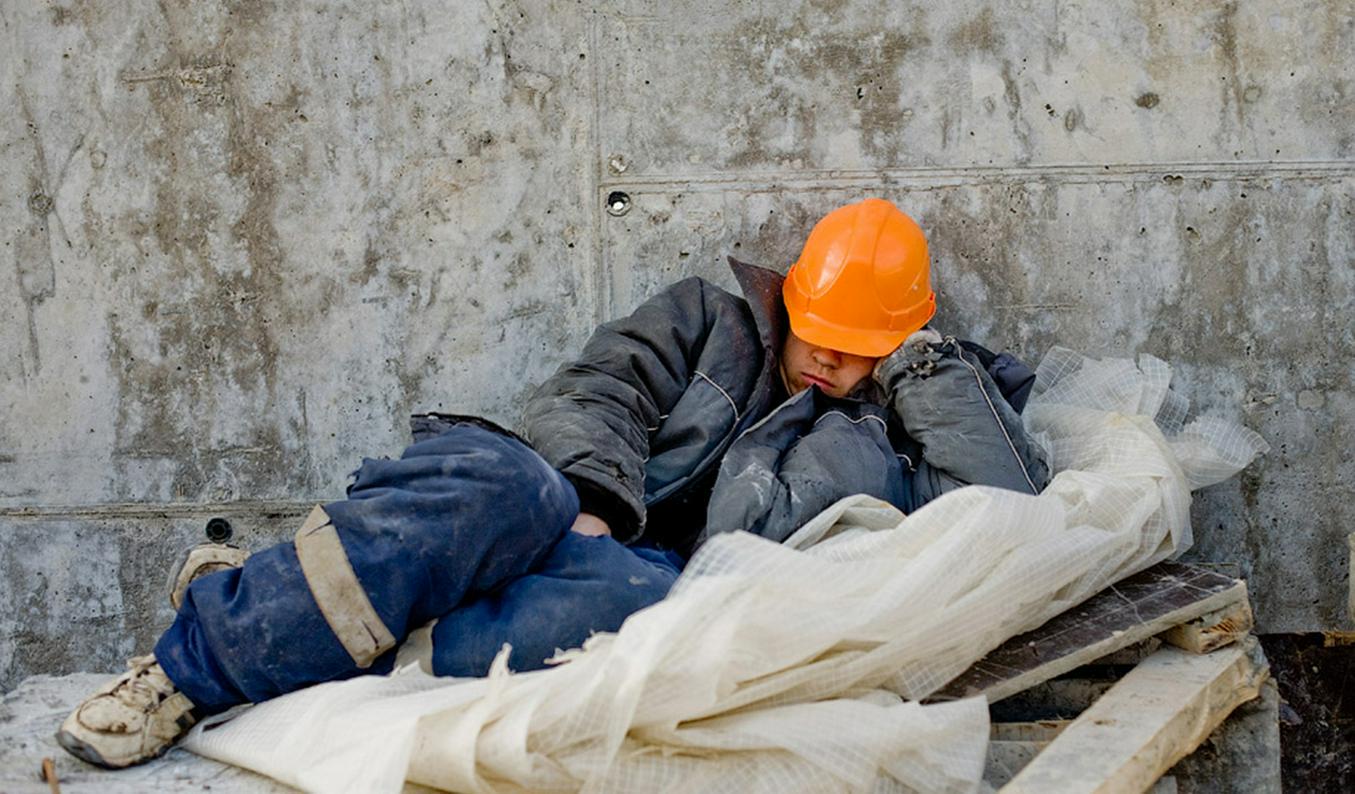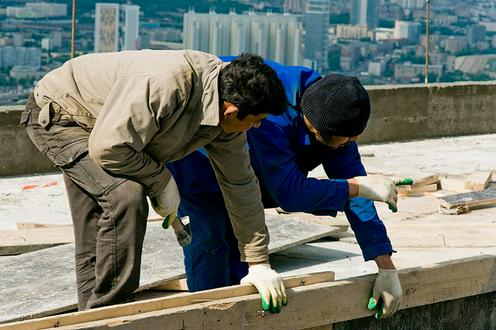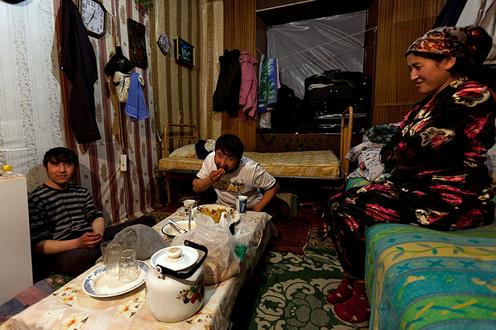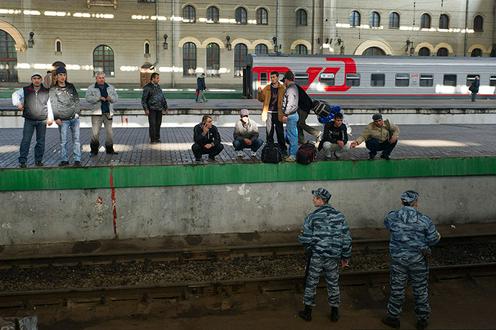What distinguishes Kyrgyz and Ukrainian workers from other labour migrants in Russia? Why do negative experiences of employment in Russia have no impact on the “soft power” of the Russian Federation? Why do Kyrgyz workers see themselves as higher up in the migrant worker hierarchy than Tajiks and Uzbeks? And finally, what can the USA learn from Russia when it comes to labour migration? All these questions are answered by the authors of a new sociological study entitled “Experiences in Russia of Kyrgyz and Ukrainian labor migrants: ethnic hierarchies, geopolitical remittances, and the relevance of migration theory”, published in the academic journal Post-Soviet Affairs.
Russia, of course, is a migration magnet of global proportions. According to statistics from the UN, the country occupies fourth place in the world in terms of the size of its migrant population, with 11.7 million people born outside of Russia living in the country in 2017. An easing of legal restrictions and the economic growth of the 2000s made Russia the most attractive destination for labour migrants from CIS countries. The most common countries of origin for labour migrants in Russia were of course Tajikistan, Uzbekistan and Kyrgyzstan, but significant numbers too came from Ukraine and Moldova.
Labour migration from CIS countries to Russia is consistent with the main social-scientific theories on migration as a social phenomenon. Economists see migration as a consequence of the rational desire of individuals to increase their income – for this reason people will always travel from poor countries to rich ones (but those best able to make the transition are those who already stand on a strong financial footing). The high wages in Russia consequently act as a magnet for the citizens of neighbouring countries. However, the new economics of labour migration (NELM) paints a more complicated picture, explaining, for instance, why migrants do not stay long in Russia and send the major part of their salaries home, in spite of classical economic theory’s precepts about the desire of the individual to maximise his or her own comfort. From the point of view of NELM, labour migration is instead a strategy for the diversification of risk: families (rather than individuals) send several of their members to different regions with different economic conditions in order to play it safe and spread their risk. From the family’s standpoint, the money transfers are not an altruistic anomaly but rather the main motive for migration in the first place.
The theory of a dual labour market explains why many occupations in Russia have come to be seen as “dirty” and low-prestige, and why Russians themselves stop applying for such jobs once they start to be taken by migrants. Finally, world-systems theory helps us to understand choices of destination country – for example, why Pakistanis and Jamaicans move to England and Arabs to France. Linguistic, cultural and social ties between old metropolises and their former colonies are maintained irrespective of political and economic transformations. As a result of the interaction of all of these factors, the report’s authors argue, a “culture of migration” is formed across whole cities and regions of CIS countries, and going to work in another country becomes a kind of norm for young people, a rite of passage on the path to attaining social maturity.
Life, though, always turns out to be more complicated than theory. Labour migrants’ real-life experience in Russia is more and more frequently portrayed in the darkest of colours: exploitation by employers, extortion and beatings on the part of the police, the xenophobia of local residents, harsh working conditions, complications with paperwork, illness, HIV... A number of academic studies confirm this bleak picture.
But if things are so awful, and the Russian economy has significantly slumped since 2014 (as a result of the fall in the price of oil and the economic consequences of the conflict in Ukraine), why do migrant workers continue to arrive in the country, and why do they keep going back? It seems intuitive that a negative experience of work in Russia could seriously undermine the “soft power” that Russia is trying to cultivate in CIS countries – so why does this not occur in practice? Finally, what previously hidden aspects of migration come to light when we compare the experience of migrants from Ukraine with that of migrants from Kyrgyzstan – distinct from each other in terms of appearance, mastery of the Russian language, and cultural proximity to the Russian population. In order to answer these questions and gain a better understanding the causes and motives of moving to another country for work and then back again, at the end of 2016, the American sociologists Theodore P. Gerber of the University of Wisconsin-Madison and Jane Zavisca of the University of Arizona conducted focus group interviews in Lviv and Bishkek with labour migrants who had recently returned home from Russia. Around 8-10 individuals of both sexes and various ages (from 18 to 49) took part in each discussion group. The advantage of focus groups as a method is that participants tend to argue amongst themselves and then come to an opinion representative of their common position, something which provides for a richer and more detailed empirical material than surveys based simply on questionnaires.
Money and contacts
From the point of view of neoclassical economics, for Kyrgyz migrants Russia is first and foremost a source of income. They are “forced out” of their homelands, where there is neither money nor work. Migrants say that they quite simply do not have anywhere to live and that the money to build a home can be found only in Russia. “Out of desperation people have to go abroad to work, in order to buy a home or a car. If it were possible to do it in Kyrgyzstan, who would want to go abroad to work? It’s not for nothing that people say: ‘in your homeland, even the sand is gold.’” Besides this, on arrival in Russia, Kyrgyz migrants do not know what work they are going to do or where – they make the journey and then start to look for vacancies.
In contrast, labour migrants returning to Ukraine only travelled to Russia after being invited there by friends and relatives for a specific job. Connections play a hugely crucial role. Aleksandr’s brother was working on the construction of facilities for the Olympics in Sochi and invited him to join him for the remainder of the project. Friends of friends of Oksana invited her to work as a nanny and she earned more money there than she had as a schoolteacher in Lviv (though she spent only six months in Russia). Tatyana’s husband’s nephew had married a woman in Moscow, at the marriage she got to know the woman and was invited to work as a nanny for the woman’s friend – and so on. The Ukrainians were more satisfied with their conditions of work and their wages, since from the start they had made an informed choice and knew where they were going, rather than taking a “leap of faith” like the Kyrgyz workers. Yet for them as for the Kyrgyz migrants, the main motive for migration was money (and also frequently to solve their accommodation issues).
On life in Russia, the focus group participants – especially the Kyrgyz – speak in very negative terms (for the Ukrainians, working conditions and standard of life are more or less the same as back home). After a lot of hassle at the border, El’mira finally reached Yekaterinburg: “I worked as a janitor and a dishwasher. The Russians don’t want to do the kind of work we do. You want to cry, but you are happy to get some money. You miss home. They were very difficult times for us,” she said, shedding tears. The theory of a dual labour market – one for Russians and one for immigrants – was clearly corroborated. Also mentioned were the familiar problems with documents, exploitative agency fees etc.: “You go to a company to get set up [with documents and a job]. The company takes half of your earnings. If your pay is 20,000 [rubles] then you only get 10,000, you have to give rest to the company. It is so hard, you crawl out of your skin in order to work.” (Cholpon).
Yet almost all the interviewed returnee migrants know fellow countrymen who have remained in Russia and do not wish to return home. The situation has a built-in tendency to snowball: the more Kyrgyz nationals there are who settle down in Russia and acquire Russian citizenship, the more their success acts as a stimulus to others to emigrate (plus, of course, they can give assistance to their fellow countrymen). However, the study’s authors point out that far from all successful migrants have sympathy for their compatriots and show solidarity with them. Many of the problems are said to be linked to the bad behavior of labour migrants themselves: “I saw how our young men get drunk and fight with each other. There or in Kyrgyzstan, everything depends on how you behave. It doesn’t matter whether we are in the Customs Union or not – relations with Russians depend on how you behave. If people behave well, Moscow is a great city. In 15 days I was not stopped by a single policeman.” (Beken).
Ethnic hierarchies
The Ukrainians were very conscious of being more valued and respected workers in Russia than migrants coming from Central Asia:
“They are not Slavs. [The Russians] don’t like non-Slavs. [The Russians] think they are dirty. That is, if at work we need to dig a hole in the ground, they don’t ask a Ukrainian to come do it. They get a Tajik or Uzbek to do it.” (Ruslan).
The fact that Aleksandr was paid twice what was paid to Tajik workers for the same work on the construction site is another indication of the dual labour market: “dirty” work is reserved, the study’s authors say, not simply for migrants, but specifically for “Eastern” migrants. The Ukrainian respondents insisted that they occupy the same position as Russians in the labour hierarchy, that no distinction is made and that they are treated well: “There is no discrimination [against Ukrainians] in Russia. I tell everyone that I am from Lviv, I even say that I’m Bandera [a reference to a Ukrainian nationalist insurgent against the Soviet Union, often associated by Russians with fascism – Fergana]. But everyone just treats that as normal.” (Ruslan). Some of the focus group members, however, recalled being called “Bandera” or hearing shouts of “Khokhol, go home” (Khokhol is a mildly derogatory term Russians use for Ukrainians – Fergana). Ukrainians argued amongst themselves as to whether these terms were actually derogatory labels or simply neutral, jokey expressions. In general, the Ukrainians agree that whatever the difficult political situation and the propaganda on TV, Russians treat them well: “getting Russians to hate Ukrainians is a serious challenge, same with getting Ukrainians to hate Russians” (Ruslan).
Kyrgyz interviewees recognised that, for Russians, they are often “second-class citizens”. At the same time, however, they see themselves as higher than Tajiks and Uzbeks in the ethnic hierarchy:
“Many Kyrgyz are educated. They have at least 10 years of schooling. The ones from Tajikistan and Uzbekistan usually have only 6–8 years. There are also many Kyrgyz who studied at university. Those who speak the [Russian] language can become managers at work.” (Cholpon).
“Those who speak Russian do well. For us it’s the same as it was 10 years ago. In Uzbekistan they stopped speaking Russian 20 years ago. But [the Russians] have good relations with Kyrgyz. At first [the Russians] get us all mixed up, we all just look like Muslims to them. But then after they hear us speak they know who is who.” (Dinara).
“We [Krygyz] are hard-working. Also, there’s language. If [Russians] ask you a question and you answer intelligibly they won’t mess with you. But when they ask Uzbeks and Tajiks for their passports they don’t understand the question, and [the police] start to harass them. We are a more literate people, therefore [the Russians] relate to us better.” (Nurlan).
Of course, such statements shouldn’t be taken as incontestable expressions of an objective social reality, but they do point to the complexity of the ethnic structure of society, far from the simple division into “locals” and “foreigners”, “Russians” and “Muslims” and so on. As the study’s authors write, Ukrainians may be spared the “dirty” work, but this does not mean they will be offered the same jobs as Russians – they generally work as nannies, nurses, and construction workers.
Geopolitical bonuses
The writers suggest that it may be precisely this pride in their cultural proximity to Russians (in comparison to other migrants from Central Asia) that causes Kyrgyz migrants to speak positively of Russia. Participants in the focus group gave detailed accounts of how, thanks to Russia, the economy of their homeland is growing, homes are being built, and the state budget gets an important boost. It is mentioned that Russia is richer and cleaner than Kyrgyzstan, and that the latter’s entrance into the Eurasian Economic Union (EAEU) has made the life and work of labour migrants from Kyrgyzstan considerably more comfortable. In other words, the image of Russia and Russians in the eyes of migrants is almost always a positive one.
In this respect, Ukrainians tend to be more critical. Yet here too, isolated insults and arguments about politics aside, the migrants interviewed in this study general spoke of good relations with Russians. They were wary of the police and admitted that, since 2014, they have felt less welcome in the country, but the real source of problems for them was not that they were Ukrainian (from the west of the country) but rather issues with documentation. The Ukrainians themselves admit that Kyrgyz and Tajik migrants in Russia have it far worse than they do.
The American academics express surprise at the fact that, regardless of the exploitative terms of employment, the abuse of law enforcement officers, the xenophobia and the hellish working conditions, mass labour migration only raises Russia’s reputation in the eyes of Kyrgyz nationals. To a certain extent, the same can be said of the Ukrainians (only they are more likely to make a distinction between their attitude towards the Russian people and their attitude towards the Russian state). Whatever difficulties migrants encounter, their experience only seems to strengthen Russia’s “soft power” in CIS countries. And in their conclusion, the US scholars suggest that it may be worth American officials mulling over whether the strict anti-immigration policies currently in place there might be depriving the country of appreciable geopolitical bonuses.
Artyom Kosmarsky
Translated by Nick L.
-
 14 February14.02From Revolution to Rupture?Why Kyrgyzstan Dismissed an Influential “Gray Cardinal” and What May Follow
14 February14.02From Revolution to Rupture?Why Kyrgyzstan Dismissed an Influential “Gray Cardinal” and What May Follow -
 24 December24.12To Clean Up and to ZIYAWhat China Can Offer Central Asia in the “Green” Economy
24 December24.12To Clean Up and to ZIYAWhat China Can Offer Central Asia in the “Green” Economy -
 23 December23.12PhotoTokyo DriveJapan to invest about $20 billion in projects across Central Asia over five years
23 December23.12PhotoTokyo DriveJapan to invest about $20 billion in projects across Central Asia over five years -
 17 December17.12Sake for SixCentral Asia’s Rapprochement with Japan Comes with Hidden Pitfalls
17 December17.12Sake for SixCentral Asia’s Rapprochement with Japan Comes with Hidden Pitfalls -
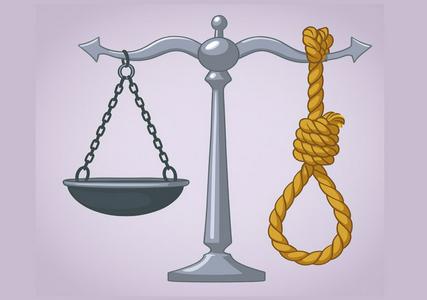 15 October15.10A Step Back into the Middle AgesWhy Kyrgyzstan Should Not Reinstate the Death Penalty
15 October15.10A Step Back into the Middle AgesWhy Kyrgyzstan Should Not Reinstate the Death Penalty -
 17 September17.09Risky PartnershipWhy Dealing with China Is Harder Than It Seems at First Glance
17 September17.09Risky PartnershipWhy Dealing with China Is Harder Than It Seems at First Glance
